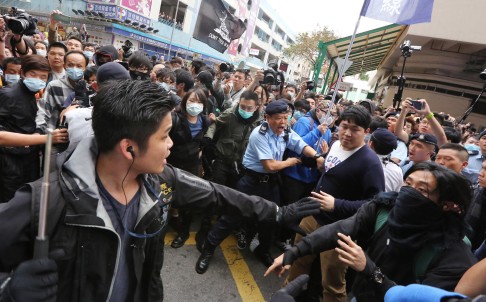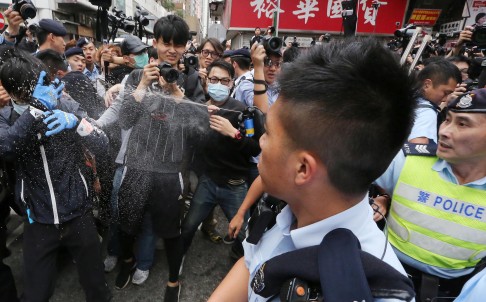
Occupy Central
Occupy Central is a civil disobedience movement which began in Hong Kong on September 28, 2014. It calls on thousands of protesters to block roads and paralyse Hong Kong's financial district if the Beijing and Hong Kong governments do not agree to implement universal suffrage for the chief executive election in 2017 and the Legislative Council elections in 2020 according to "international standards." The movement was initiated by Benny Tai Yiu-ting (戴耀廷), an associate professor of law at the University of Hong Kong, in January 2013.

Umbrella Movement
The Umbrella Movement (Chinese: 雨傘運動; pinyin: yǔsǎn yùndòng) is a loose political movement that was created spontaneously during the Hong Kong protests of 2014. Its name derives from the recognition of the umbrella as a symbol of defiance and resistance against the Hong Kong government, and the united grass-roots objection to the decision of the Standing Committee of the National People's Congress (NPCSC) of 31 August.
The movement consists of individuals numbering in the tens of thousands who participated in the protests that began on 28 September 2014, although Scholarism, the Hong Kong Federation of Students, Occupy Central with Love and Peace, groups are principally driving the demands for the rescission of the NPCSC decision.
The movement consists of individuals numbering in the tens of thousands who participated in the protests that began on 28 September 2014, although Scholarism, the Hong Kong Federation of Students, Occupy Central with Love and Peace, groups are principally driving the demands for the rescission of the NPCSC decision.
POST OCCUPY CENTRAL - DAY 76:
Full coverage of the day’s events on 01-03

Parallel trading
The influx of parallel traders who buy their stock tax-free in Hong Kong to resell it in mainland China at a profit is causing growing unrest. Residents of Sheung Shui, a town close to China's border, say the increase in parallel importers has pushed up retail prices and causes a general nuisance. Importers argue that their trade benefits the Hong Kong economy.
Hong Kong protest sees violence, pepper spray and arrests, but triads stay away
Police use pepper spray amid chaotic scenes as protest against traders continues into the night

Chaotic scenes hit the narrow streets of Yuen Long yesterday as the clashes marred the latest protest against mainland traders - but police fears of a violent counter-protest involving triads proved unfounded.
Police used pepper spray to break up clashes as the 200 or so protesters and opponents exchanged foul-mouthed insults as they marched from Long Ping MTR station to Sau Fu Street, where a cluster of shops serve mainland buyers.
Watch: Hong Kong police use pepper spray after scuffles break out at anti-parallel trading protest
The march was the third in a month targeting so-called parallel traders, who buy goods in Hong Kong to sell across the border. Demonstrations in Tuen Mun and Sha Tin last month turned ugly, and police sources told the Postlast week that they had warned rural strongmen against calling in triad henchmen to confront marchers.
Disputes yesterday occasionally escalated, and police moved in with pepper spray. Several reporters were also sprayed, while one photographer received a wound to his chest.
Police arrested 33 people, aged 13 to 74, for offences including possession of weapons, common assault and assaulting police. Further arrests could follow, the force said.
Five officers received treatment in hospital for minor limb injuries.
The protesters, most in their 20s and 30s, chanted, "Go home and buy mainland products!" while opponents cried, "No one welcomes you guys, go home!"
Residents appeared divided. Some sympathised with the protesters, who say parallel traders overcrowd towns and edge out stores that serve locals. Others felt the traders brought economic benefits while the protesters were the ones causing disruption.
"Many of those rural gentry are landlords of those shops [that target mainlanders]," said one woman, a law student, referring to rural leaders who led opposition to the protest.
But the owner of a hair salon said he had to close his doors, adding: "Protests like this will only make things worse."
About 30 protesters from Hong Kong Indigenous - formed by people involved in last year's Occupy pro-democracy movement and which joined last month's protests - wore armour under their jackets.
"This [armour] is purely for self-defence. We'll separate the conflicting parties should anything happen," said spokesman Ray Wong Toi-Yeung, 22.
Wong asked protesters to disperse at about 4pm and not crowd the town's main road. Some, however, took that as a signal to do the opposite. Traffic was briefly disrupted on Castle Peak Road, and groups of protesters were still in the town at 10pm.
Security chief Lai Tung-kwok yesterday said police would act "resolutely" should anyone break the law during the march.
Leung Che-cheung, a lawmaker and chairman of Yuen Long district council, said about 30 shops had been forced to close. Wong Tat-kwong, president of a local chamber of commerce, said its 1,000 members could sue over their losses.
Meanwhile, state media was apparently trying to cool antagonism, while an article credited to Zhang Dinghuai, director of the semi-official Chinese Association of Hong Kong and Macau Studies, advised against hostile rhetoric on both sides "which would harm cross-border relations".
This article appeared in the South China Morning Post print edition as 33 arrests but no triads at Yuen Long march.

Views sharply divided over mainland Chinese shoppers visiting Hong Kong's Yuen Long
Yuen Long leaders, businesses back visitors; residents less enthusiastic

As you hop off bus B1 from the border at Yat San Street and take a walk along Castle Peak Road in central Yuen Long, three pharmacies in very close proximity already have their doors wide open waiting for the Shenzhen shoppers.
As you walk further along to the junction of Tai Tong Road and Castle Peak Road, the pavement gets narrower and people - some pushing trolleys - scramble through to their next shopping destination.
Lu Kaiyi, who lives in Shenzhen, was carrying a suitcase. She was ready to spend a few thousand dollars on skincare products, daily essentials and drugs.
She visits Yuen Long once a week on her multiple-entry permit. She says she finds protests against mainlanders "radical".
"It may be true that many mainlanders coming to Hong Kong to shop cause crowded streets and products being out of stock. But think about it some more, because without the individual travel scheme Hong Kong would not be as prosperous as it is now," Lu said.
A housewife, who gave her surname as Ho, moved to Yuen Long from Sha Tin three years ago. She said the town was becoming ever more crowded.
"If I had a choice I would have moved back to Sha Tin. The pavement [here] is too narrow. It's too crowded … There are many trolleys around, and people don't apologise when the wheels run over my foot. It's as if I'm standing in their way," Ho said.
Her view was echoed by Hong Kong fashion designer William Tang Tat-chi, an indigenous villager who has lived in Ping Shan near Yuen Long for over 40 years.
Tang said he was "sad" to see Yuen Long rapidly developing in recent years, especially after the opening of new border checkpoints in Lok Ma Chau and Shenzhen Bay, making it easier for Shenzhen residents to visit.
Things have certainly changed. Traditional bakeries and shops selling Chinese sausages and other traditional groceries have been forced to make way for pharmacies, jewellers and cosmetic shops because of rising rents.
Tang slammed politicians and the government for doing nothing to improve town planning amid "unbalanced" development, a continual increase in the number of people living in Yuen Long and parallel traders and mainland visitors flooding the narrow streets.
He said Yuen Long had been "prostituted" by parallel traders and Shenzhen visitors at the expense of the daily life of locals.
"This is like rape, and they put down money after their dealings. They don't have to care about the mood and the state of the prostitutes' bodies. Yuen Long people are not prepared for this and they do not expect it either," said Tang.
But his remarks upset district leaders. DAB legislator Leung Che-cheung, who also chairs the Yuen Long District Council, said: "It is an overstatement … There is nothing wrong in doing business. We should not label them as if they are criminals."
Shap Pat Heung rural committee chairman Leung Fuk-yuen also disagreed with Tang's views. "He is a designer and knows much about fashion. Perhaps he sees social issues from a more artistic point of view," he said, adding that respect was expected from a fellow indigenous villager.
A staff member at Well Done Pharmacy, who gave his surname as Chan, said he believed doing business with mainland customers would not affect the lives of locals. He said 70 per cent of customers were from the mainland.
Kowloon Motor Bus, which operates the B1 service between Tin Shui Wai and the Lok Ma Chau border checkpoint, said additional frontline staff had been sent to bus stops on the Yuen Long section of Castle Peak Road at peak hours.
This article appeared in the South China Morning Post print edition as Views sharply divided over mainland shoppers









沒有留言:
張貼留言